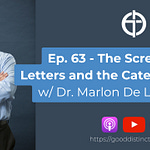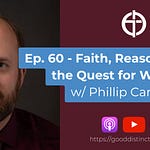NOTE: THIS EPISODE WAS PUBLISHED BEFORE OUR REBOOT. willwrightcatholic.com is now gooddistinctions.com
Why Do Bad Things Happen to Good People?
St. Thomas Aquinas when answering the question of whether God exists brings forward two objections. The second objection says that everything we see in the natural world can be explained by nature or by human reason; therefore, we do not need to suppose God’s existence. To this objection, St. Thomas says that we can trace back what is done in nature back to the first cause, which must be an immovable and self-necessary first principle, which we call God. He then references his Five Ways which are converging and convincing arguments to demonstrate God’s existence.
For the remainder of today, I would like to focus on the first objection that St. Thomas raises to God’s existence. If you are unfamiliar with the disputed question format used by St. Thomas in the Summa and in many other scholastic works, it goes like this. There are objections posed, then a section where a brief response is given beginning with “on the contrary.” Then the main teaching is delivered in the “I answer that” section and is followed by the specific responses given for the objection posed at the beginning of the article.
For the first objection to God’s existence, St. Thomas puts it this way:
“It seems that God does not exist; because if one of two contraries be infinite, the other would be altogether destroyed. But the word ‘God’ means that He is infinite goodness. If, therefore, God existed, there would be no evil discoverable; but there is evil in the world. Therefore God does not exist (ST I, q.2, a.3).”
Of course, this is an argument, not a slam dunk. God does exist and He is goodness itself. But can you feel the weight of the argument? If God is infinitely good, then why is there evil? In other words, why do bad things happen to good people?
Here on Earth, there is no sufficient answer to this argument. How can there be, really? We see evil happen and sometimes the human suffering which results is so extreme that no justice seems to ever come to fruition. Or perhaps it is not moral evil but physical evil. Why do children develop horrifically painful diseases? Why do mothers and fathers lose their children to miscarriage and stillbirth? In the goodness of creation, why are there devastating natural disasters that cause widespread death, destruction, and catastrophe?
The Problem of Evil
This so-called “Problem of Evil” has plagued philosophers, theologians, and ethicists for millennia. The presence of evil and suffering in the world is the strongest argument against an omnipotent, omnibenevolent, and omniscient God. The logical formulation of the problem of evil is laid out in Aquinas’ objection, and we will get to the response to this objection a bit later on. The evidential formulation, on the other hand, is the one that packs the biggest punch because we can see gratuitous evil, pain, suffering, and misery. No one needs proof that evil exists; we need look no further than our own sins or the sins of those around us to show its existence. The reason that the evidence of evil is so powerful is not based on its logical intricacies but because of emotion.
The natural human response to suffering, pain, blatant evil, and injustice is repulsion. We have a visceral, subconscious reaction to the evil that we encounter. And we wonder: how could God allow this? I imagine that if you have never asked this question, “how could God allow this?” then you are fortunate enough to have not suffered a real trauma.
I want to share a time of suffering in my own life to begin to show how we can handle inevitable sufferings when they come. My wife and I suffered a miscarriage a few years ago, and I did not know how to process it. I did not allow myself to recognize and feel my feelings. And after a few months, I realized that I was very angry with God and was depressed and despairing. How could He do this to me and to my wife? What did I do wrong? It was horrendous. I still have a profoundly vivid memory of lowering my son Gabriel’s little casket into a hole in the ground. It was truly awful and unnatural. I know that my wife and I desired Baptism for him and I believe firmly that he is in Heaven interceding for us. But I wanted to hold him. I wanted to get to know him here on Earth and watch him grow like my other boys. Yet, it was not to be.
Since then, we suffered another miscarriage but this time I felt my feelings a bit more intentionally. I talked about the experience with friends and my priest. I grieved. I wept. I prayed. But I did not despair this time. What was different? Most recently, I experienced the same emotions but I recognized and gave them over to Jesus, as best as I could muster. I aimed to unite my suffering with His Cross in a more profound way than a few years ago. The suffering was imminently present, but by grace I was able to abandon myself more to Providence, I suppose. My response of faith and abandonment to Divine Providence was not perfect but I am positive that I grew over these last years.
So, when suffering, pain, and evil come, and they will, and we ask “how could God allow this?”, what is our response? Before we get more into the response to the problem of evil, I want to look at what evil actually is. That way, we can better recognize it and even avoid it, to some extent.
What is Evil?
The Catholic Encyclopedia teaches that there are three kinds of evil: physical, moral, and metaphysical.
Physical evil arises from nature and includes sickness, accident, death, anxiety, disappointment, disabilities, and imperfections in regards to the full development of human powers.
Moral evil is the “deviation of human volition from the prescriptions of the moral order and the action which results from that deviation (Catholic Encyclopedia).” These are intentional acts which transgress against the precepts of the Catholic religion or of the nature of the human person, generally.
Metaphysical evil is the mutual limitation of various parts of the natural world. The climate and natural causes adversely affect plants and animals. Predators rely on the destruction of life to remain alive themselves. The constituent parts of nature also have a system of perpetual decay and renewal. This type of “evil” is really more a relative perfection rather than an imperfection because creation was designed, as it is, by God.
In all cases, evil is negative, not positive. Evil consists in the loss or deprivation of something necessary for perfection. Pain has a disturbing effect on the sufferer and is, thus, a physical evil. Moral evil is evil because we are using reason improperly to choose a lesser good or neglect a higher good.
Some argue that evil does not actually exist. Instead it is merely a “lesser good” in place of a higher good that ought to be. It is an imperfection where perfection ought to be. It is a hole where there ought to be a whole. But our human experience points to a more complicated reality.
What we can be sure of, though, is that God did not create evil nor does he cause evil. Nothing is evil in itself, but is evil in relation to other things or persons. The same fire which burns and destroys gives life-giving light and heat. The same water which drowns gives life and nourishment. The same free will which chooses evil has the capacity to choose good.
Perfect vs. Permissive Will of God
God is perfect. He does not suffer any defect of weakness or change. He does not change His mind. If He could change, then He would simply not be God. In His wisdom, He created all things visible and invisible with the Divine foreknowledge that His creatures, namely humanity and some of the angels, would spurn Him. This is a mystery. He had no need to create anything, but He did so to manifest His goodness, wisdom, power, and love.
One of the important distinctions to draw at this juncture is the difference between God’s permissive will and His perfect will. Simply put: God has a perfect will. Another, admittedly imperfect, way to phrase this would be His “original plan.” The perfect will of God for humanity consisted of a desire for Adam and Eve to follow his indicative will. The indicative will of God is what He wants and how He wants it, perfectly. We see this indicative will for Adam and Eve in Genesis. He told them not to “eat the fruit of ‘the tree of the knowledge of good and evil’ (Gen. 2:17).” When Adam and Eve disobeyed sin, entered the world, along with the consequences of sin: suffering, pain, and death.
Human suffering was not part of God’s original plan. In giving humanity free will, God permitted, or allowed, evil to enter the world. His free creatures, made in His image and likeness, rebel against His indicative and perfect will and commit evils. These are not within the perfect will of God; they belong tacitly to the permissive will of God. And He alone has the long-view. Only He knows the end of the story. And He assures us that His justice will come to full fruition in the end.
What is the Response to the Problem?
We should recall the great diversity of metaphysical evil which comes together to embody the universe as a whole. Stars explode and go supernova. Matter is sometimes transformed in violent and destructive ways. Predators eat other animals. Herbivores eat, and therefore destroy, plants. These relative perfections are not imperfections. Then, we stop to think about physical evils which befall mankind: sickness, plague, death, anxiety, and the like. And we know that human suffering often comes from true moral evil. The world and its inhabitants seem far from what might approximate perfection.
Frankly, this is where human reason hits an insurmountable roadblock. No ideology, school of thought, or religion can sufficiently speculate about the order of nature. Though we cannot know with human intelligence the full understanding of this mystery, we can be assured that God is completely justified. We can experience suffering and pain and wonder why it is happening while simultaneously acknowledging that God, in His perfect goodness, knowledge, and power, does know. Not only does He know, but He also fully cares.
The response to the Problem of Evil is not logically satisfying because it is a mystery with no earthly solution. But as St. Thomas More said, “Earth has no sorrow that Heaven cannot heal.” The Catholic Faith as a whole gives the only satisfactory response to the Problem of Evil, even if it is not emotionally satisfying when we are in the thick of it. And this response is not an “easy answer.” It is not a quick response which puts the problem to rest. Instead, the response to the problem of evil bears fruit in prolonged contemplation, the practice of trust, faith, hope, love, prayer, study, and only with God’s grace.
Let us return to St. Thomas Aquinas’ exploration of the objection to the existence of God based on the problem of evil. He responds this way, quoting St. Augustine:
“As Augustine says (Enchiridion xi): ‘Since God is the highest good, He would not allow any evil to exist in His works, unless His omnipotence and goodness were such as to bring good even out of evil.’ This is part of the infinite goodness of God, that He should allow evil to exist, and out of it produce good (ST I, q.2, a.3).”
Like I said, it is not an emotionally satisfying answer. We long for justice and peace. And we want it now. In our fallen world, it can be easy to give in to despair. But we are called to trust in the infinite goodness of God. If He allows evil to exist, then He will produce a good out of it, though we may not see it in this lifetime. If He allows evil to exist, then His justice will be made perfect in the end.
As St. Paul teaches us:
“We know that in everything God works for good with those who love him, who are called according to his purpose (Rom 8:28).”
Redemptive Suffering
And as I have already mentioned: God not only knows of our suffering but He also fully cares. We can see this on full display in the apparent triumph of evil, pain, and suffering on Good Friday. On the Cross, the Son of God died for love of you and me. If we were there on Calvary’s hill, we would be justified to some extent to question God’s wisdom or His omnipotence. For the Apostles, this dark day seemed like the end. How could a good possibly come from all this suffering, misery, and death? Even the demons thought that they had won a great victory. But the story did not end on Friday. On Easter Sunday, Jesus Christ burst forth from the tomb, the one who died who dies no more. Our God knows the way through suffering and death to eternal life.
As the Catechism puts it:
“By his passion and death on the cross Christ has given a new meaning to suffering: it can henceforth configure us to him and unite us with his redemptive passion (CCC 1505).”
In moments of affliction, suffering, and pain, we can offer these experiences as prayers when we unite them to the perfect Cross of Christ. Our sufferings then are transformed into grace for ourselves and others. We can “offer up” our sufferings for others, and it can even bring us spiritual healing and peace.
Taking the Long Perspective
Human suffering is real and persistent. We all suffer. In this valley of the shadow of death, we do not see the full picture. In our limited human perspective, we do not even always see the good that God works in spite of evil. Nonetheless, the merits of Christ on the Cross continue to flow as grace to us through the Sacraments. And so, we hold fast to the truth of the Catholic Faith. We trust in God, especially in the darkest times. Through consistent prayer and cooperation with grace, we intentionally unite our sufferings to the Cross and conform ourselves to the Savior. We rely on the intercession of the sorrowful and immaculate Heart of Mary who was pierced by accompanying her holy Son on the way of His Passion.
May we contemplate and, by God’s grace, eventually adopt the perspective of the great St. Teresa of Avila who said that:
“In light of heaven, the worst suffering on earth will be seen to be no more serious than one night in an inconvenient hotel.”
This does not downplay the real pain of human suffering. But it helps us enter into the eternal viewpoint of Almighty Good, who knows and cares.














Share this post